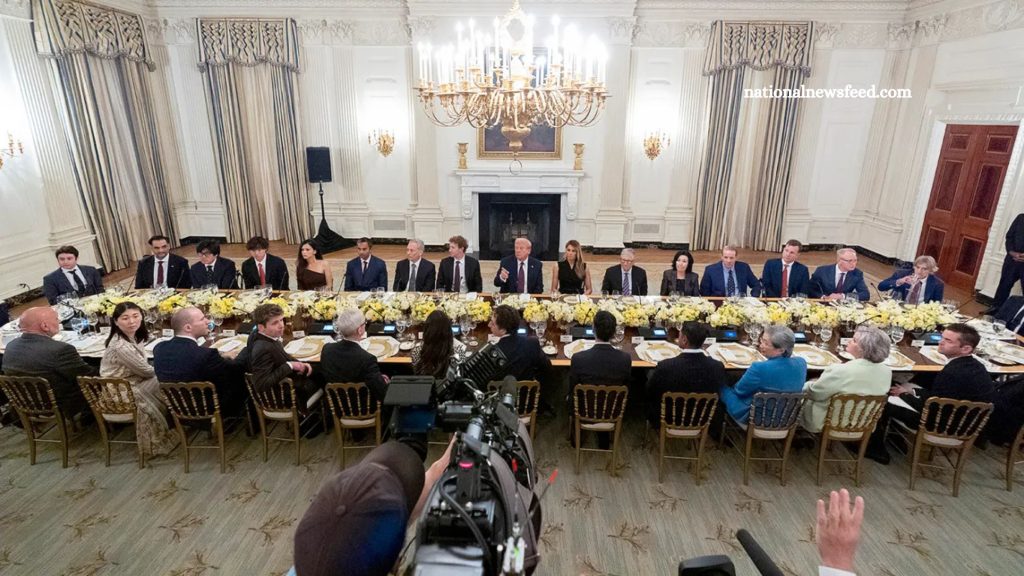Top executives from major tech companies and global corporations are actively courting President Trump, eager to secure influence and favor in his second administration. Thursday night’s White House event showcased this dynamic, as the State Dining Room hosted more than two dozen high-profile leaders, including Mark Zuckerberg, Bill Gates, Sam Altman, Tim Cook, and Sundar Pichai.
Economic Policies Drive Business Engagement
Trump’s economic agenda, including tariffs, Federal Reserve uncertainties, and rising unemployment, has posed challenges for the business community. Yet, these policies also serve as a strong incentive for CEOs to gain face time with the president. Beyond navigating global trade relations and volatile markets, executives are seeking a role in shaping artificial intelligence (AI) policies, data center expansion, and pending antitrust cases.
“Sometimes it’s a bit of a circus, but they feel like he hears them,” a senior Washington lobbyist said. “To get anything out of it, you have to show up and engage. That’s just the way it is.”
Read More: 5 Key Insights from RFK Jr.’s Clash with GOP and Democratic Senators on CDC and Vaccines
Major Tech Investments Highlighted
During the dinner, Trump asked CEOs to share their companies’ U.S. manufacturing investments—a key element of his tariff strategy aimed at bringing production back home. Zuckerberg announced Meta would invest at least $600 billion in the U.S. through 2028. Google’s Sundar Pichai pledged $250 billion, while Tim Cook confirmed Apple’s $600 billion plan.
These commitments underscore the transactional nature of the relationship between Trump and business leaders. Former Rep. Chris Carney (D-Pa.), now a senior policy adviser at Nossaman LLP, explained, “CEOs have a responsibility to protect their business equities. If they aren’t at the table, they may be on the menu.”
AI and Antitrust Concerns
AI development and regulation featured prominently in discussions. Pichai praised the administration’s AI action plan, while Google recently won a significant legal victory over its Chrome browser monopoly, allowing the company to continue key operations despite antitrust scrutiny. Leaders from OpenAI, Scale.ai, Meta, and Groq also attended, signaling the high stakes in AI policy and market competition.
Navigating Uncertainty
Despite these engagements, some business leaders remain cautious. Tariffs, regulatory changes, and potential government shutdowns have created an unpredictable environment. “Many are impacted by tariffs and constantly shifting rules,” Carney said. Lobbyists advise clients to approach Trump strategically, emphasizing support for his policies rather than confrontation.
“Do not go into the White House and argue the facts,” the lobbyist said. “You need to show understanding of the president’s policies while suggesting ways he can be more successful.”
Influence Beyond Economics
Trump’s influence extends beyond tariffs and trade. Many companies have scaled back diversity, equity, and inclusion (DEI) initiatives that were prioritized under the previous administration. High-profile tech executives have maintained a visible presence in Trump’s orbit, attending his inauguration and Mar-a-Lago events, and continuing engagement during his second term.
White House spokesman Kush Desai highlighted the benefits of these relationships: “President Trump’s friendly ties with CEOs and industry titans have been critical to securing trillions in investments for American manufacturing and technology. Business leaders know they have a friend and fellow businessman in the Oval Office.”
A More Cooperative Climate
Trump himself has acknowledged the shift in corporate sentiment. After meeting with Cook in December, he noted that business leaders are more willing to collaborate this time around compared to his first term. “The first one they were very hostile … and this one is very much less hostile,” he said, emphasizing a more cooperative business climate.
Frequently Asked Questions
Why are tech executives meeting with President Trump?
Tech leaders are meeting with Trump to gain influence on economic policies, AI regulation, U.S. manufacturing incentives, and antitrust cases. These meetings provide a direct channel to discuss their companies’ priorities and investment plans.
Which tech CEOs attended the recent White House event?
Notable attendees included Mark Zuckerberg (Meta), Bill Gates (Microsoft), Sam Altman (OpenAI), Tim Cook (Apple), and Sundar Pichai (Google), among over two dozen high-profile tech and business leaders.
How does Trump’s tariff policy affect tech companies?
Trump’s tariffs encourage companies to produce in the U.S. rather than overseas. Companies face potential costs if they continue foreign manufacturing, but meeting with the president allows them to navigate these policies strategically.
What topics do tech executives discuss with Trump?
Discussions often include U.S. manufacturing, AI policy, antitrust issues, global trade relations, and strategies to minimize the impact of tariffs. Executives also highlight their company investments and technology initiatives.
How do CEOs approach meetings with Trump?
Executives are advised to emphasize support for the president’s policies while subtly suggesting ways to optimize them. Directly opposing or criticizing his policies is generally avoided to maintain a productive relationship.
Why is AI a major focus for these discussions?
AI represents a high-stakes area of innovation and competition. Tech companies seek favorable policies and regulatory clarity while navigating antitrust concerns and government oversight.
Has Trump’s relationship with CEOs changed in his second term?
Yes. Many CEOs report a more cooperative atmosphere compared to his first term, with executives showing increased willingness to engage and align with the administration’s priorities.
Conclusion
The recent White House gathering highlights the strategic relationship between top tech executives and President Trump. CEOs and business leaders are leveraging these opportunities to influence economic policy, AI regulation, and U.S. manufacturing initiatives while navigating the complexities of tariffs and global trade. This transactional, high-stakes engagement reflects a broader trend of corporate America actively shaping the political and technological landscape.

